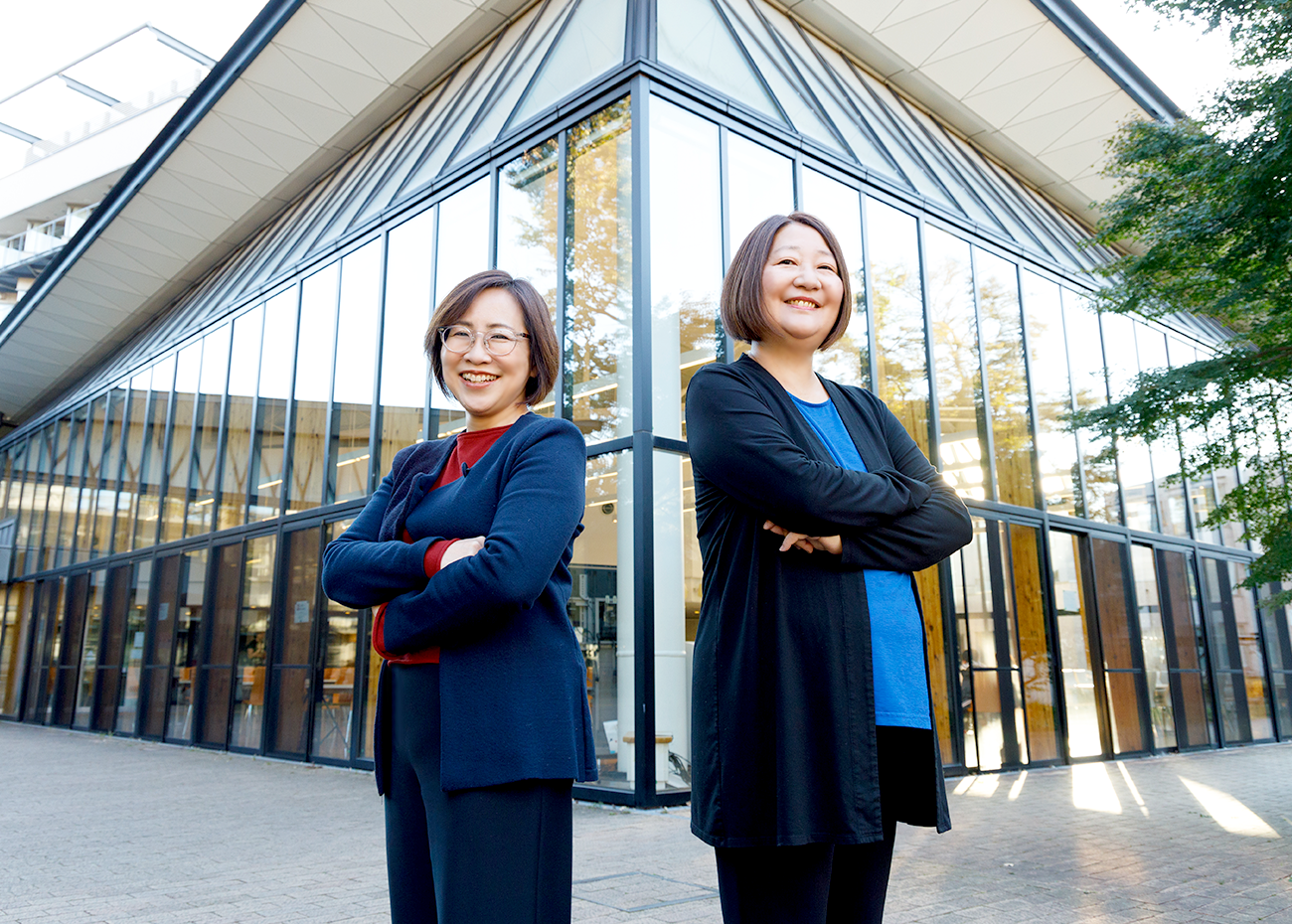

#Human Rights #Literature #Gender #United States #New Administration
The dialogue took place on November 8, 2024.
Professor Natsumi Ikoma, CLA Dean of ICU who specializes in literature and gender, and Professor Tomomi Yamaguchi, a cultural anthropologist who taught extensively at Montana State University in the U.S. and now at Ritsumeikan University, deliberated on the mission to safeguard human rights and the practical strategies for implementation through their common research area in gender studies.
Building an Inclusive World Where Everyone Plays an Important Part
Cultivating Leaders for a Peaceful Future
In 1953, students of the ICU inaugural class signed a pledge at the matriculation ceremony, in which they committed to spend their college years adhering to the principles of the Universal Declaration of Human Rights, which upholds fundamental human rights. The tradition continues to this day, with every student signing a pledge to abide by the UDHR upon entering ICU. For over 70 years, the University’s mission has been to nurture global citizens who contribute to world peace by rebuilding Japan as a country open to the world. Every aspect of ‘living & learning’ in the campus community is founded on this respect for human rights.
At the root of the liberal arts education ICU offers in cultivating global citizenship is an understanding of others through dialogue. By bridging differences via dialogue, ICU fosters the capacity to work amicably with others. What kinds of differences should we address indaily campus life? Ikoma pointed out, “The main distinctions we needed to overcome in the world were race and religion, but from around the 1990s, gender became another important issue.”
What are the issues and prospects concerning gender in the U.S. and Japan? And what are the ideals and potential of DEI (diversity, equity, inclusion), an all-encompassing concept that includes gender?
INDEX
- 01 The State of Gender Equality in Higher Education: Approaches in Japan and the U.S.
- 02Advancing Human Rights Awareness through Gender Equity Advocacy
- 03Gender Issues at ICU: Efforts and Evaluation
- 04Expectations for ICU in Promoting Gender Equity and Research in Gender Studies
- 05From Gender to DEI: Expanding the Concept of Human Rights
Paragraph 01
The State of Gender Equality in Higher Education: Approaches in Japan and the U.S.
―― Currently, the term 'gender' is widely recognized and frequently used. Historically however, there was an era when the backlash against gender equity was rife. We asked the two professors to describe what it was like at the time.
Ikoma: When I arrived to teach at ICU in 2003, the anti-gender movement was still very strong. People argued that gender studies should not be considered a proper field in academia or that it was only relevant for women. In my first five years here, some students openly questioned its value as an academic discipline, demonstrating a notable lack of receptiveness. It was fortunate that ICU faculty members have been supportive throughout without any major opposition.
Yamaguchi: After the implementation of the 1999 Basic Act for Equal Society, a backlash against gender started, which culminated between 2002 and 2005. I believe you started teaching at ICU during this period.
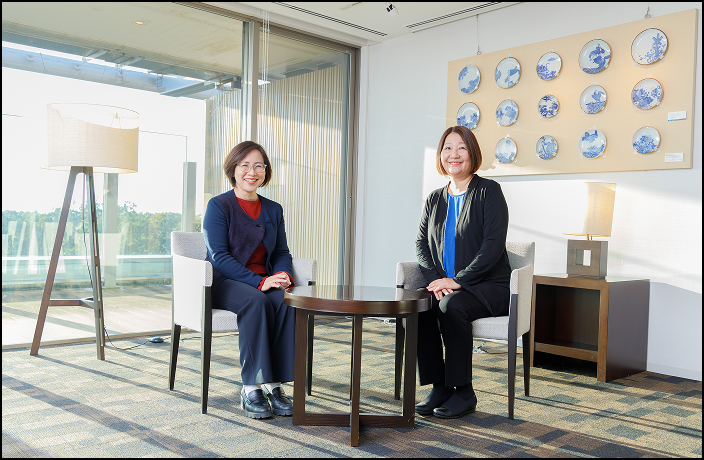
Ikoma: I knew there were scholars at other universities conducting research in the field, but they were a minority and often isolated. Seizing the opportunity presented by ICU's leadership in gender studies, we immersed ourselves in activities such as building a network with others in the same field.
―― ICU is a trailblazer in the field of gender studies in Japan. The University not only recognized the area as an independent field of research, but also implemented the philosophy as a global standard in every aspect of its ‘living & learning’ on campus. Despite opposition towards gender studies, the ICU Center for Gender Studies (CGS) opened in 2004*1. Ikoma was involved in its inception from the preparatory stage. The Center was a cutting-edge endeavor in Japan at the time, as it was also open to students. Many other universities followed suit to emulate this initiative at ICU.
Ikoma: Sociology faculty had been supporting sexual-minority (often abbreviated now as LGBTQ *2 students before I arrived at ICU, which led to the establishment of the CGS. The turning point came when a student requested a change of name on the school register: ICU confirmed with the Ministry of Education, Culture, Sports, Science, and Technology if this was possible, and this was implemented. From this point onwards, the University engaged actively with research and teaching in gender studies, with organizational support for minority students provided by the new Center. A year after its establishment, gender sexuality studies was incorporated into the undergraduate program. It remains one of 31 majors currently offered in the CLA.
Yamaguchi: In the U.S., different administrations have varied in their approach to handling changes to transgender students' names on the school register. During the Obama administration, the Department of Education issued a guideline under Title IX, which prohibits sexual discrimination in education, extending this protection to include discrimination based on gender identity. The guideline allowed students to change their name on the register if they so requested. After this was overturned by the Trump administration, it was restored to its former state by President Biden. Unfortunately, it will probably be revoked by the new Trump administration*3. Name changes are not the only issue affected by the varied stances of each administration regarding gender policy.
――Can you tell us about the overall approach to gender issues at higher education institutions in the U.S.?
Yamaguchi: At Montana State University where I taught, we have humanities and social science majors like anthropology, but more emphasis is laid on STEM subjects (science, technology, engineering and mathematics) such as computer science and chemistry. In this kind of environment, I was in charge of the interdisciplinary program, Women’s, Gender and Sexuality Studies. I had hoped to establish gender studies as a major, but the University's focus on STEM, combined with Montana's conservative stance, restricted it to a minor with only a limited selection of courses available.
Needless to say, many universities in the U.S. have long-standing gender studies programs. At the University of Michigan, where I studied, research had started from student initiatives in the 1970s. Currently it has both a gender studies institute and a support center for LGBTQ students. This is not rare in the U.S., but not all institutions can engage with the field, especially state universities which are heavily funded by the state. They are influenced by the political climate at both the federal and state levels, with circumstances differing across states. As beneficiaries of corporate donations, external factors also affect private universities, with federal administration policies further complicating the situation.
――What is your impression of the effort at ICU, compared to the situation in the U.S.?
Yamaguchi: From an outsider's perspective, the CGS at ICU has been at the forefront of research including nonbinary genders not limited to cisgenders alternative sexuality in Japan. Currently very few institutions offer an environment where LGBTQ students can study in comfort. Although certain aspects may need improvement, it is essential for students to experience their college years in an environment actively working to alleviate anxiety. In this respect, ICU plays a very important role in the history of gender studies in Japan.
Ikoma: Creating a safe place for students has been one of the major objectives of the CGS since it was established. ICU has 6 other research institutes and centers, but they are basically for faculty research, and not open to students. But, since its inception, the CGS has emphasized creating a relaxing space for students, offering sofas and a library with books on gender studies available for checkout.
*1…CGS offers space for communication to anyone interested in gender sexuality studies. Its main objectives are: (1)to move away from a passive mindset of merely accepting information from the West, towards active dissemination of information about Japan to the world; (2)to build a network in Asia with those interested in women’s studies, men’s studies and gender studies; and (3)to support the gender sexuality studies major at ICU to stretch its horizons to encompass, not only the social sciences and humanities, but also the natural sciences.
*2…LGBTQ: sexual minority acronym encompassing lesbian, gay, bisexual, transgender, and queer or questioning)
*3…As soon as President Trump assumed office, he signed a Presidential Order on January 20, 2025, proclaiming that his administration would only recognize two genders, male and female. On January 31, the Department of Education rescinded the Biden administration’s guideline to respect the human rights of transgenders.
Paragraph 02
Advancing Human Rights Awareness through Gender Equity Advocacy
Gender Equity ―― Following the backlash that peaked in 2005, 'gender' became a sensitive word in Japan, requiring care in its use for a period of time. But it gradually became a household term. This was primarily driven by a shift in mindset among the younger generation. One of the factors impacting the situation was the #MeToo movement, where accusations of sexual harassment were marked with #MeToo on social media*4.
Ikoma: Around the time the #MeToo movement brought to light the extent of sexual harm, people started to empathize with gender issues. In Japan, women began to realize that what they had previously endured might have been sexual harassment or discrimination. Those who were previously averse to the term 'gender,' especially women, began to recognize the gender issue as their own.
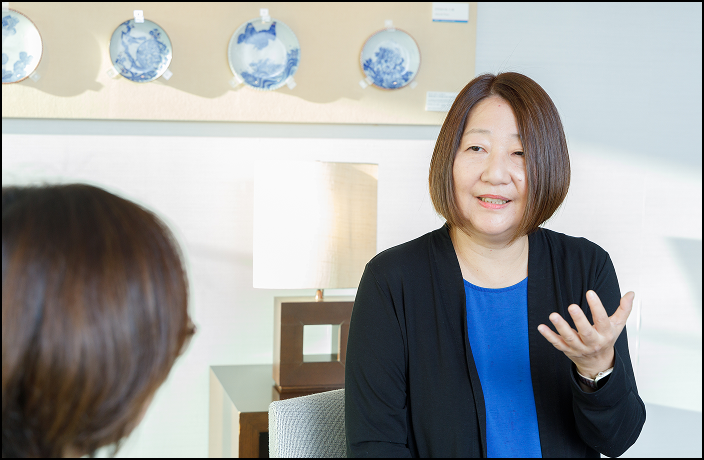
Yamaguchi: In the U.S., the younger generation had adopted a broader and more nuanced understanding of gender. The 2015 Supreme Court ruling that legalized same-sex marriage had far-reaching impact, instantaneously making a union between two people of the same sex recognized nationwide. These students had been participating in demonstrations against guns in the aftermath of the Florida’s Parkland Highschool shooting in their teens. Then we had the Black Lives Matter movement protesting discrimination and violence against blacks and the#MeToo movement. Confronted with severe inflation in recent years, students are struggling to secure safe and affordable housing. They have come to understand that gender plays a significant role in this issue. For female students, the 2022 reversal of the Roe vs. Wade decision had a big impact. A sense of political crisis has driven students to major in related fields such as women’s and gender studies.
―― What about the change in thinking among Japanese students?
Ikoma: I feel more students are entering ICU with awareness for gender problems. The fact that we have the CGS contributes to our emphasis on gender education. A good number of students choose to study here because of our support for LGBTQ. This indicates that our students have a high regard for human rights. The annual intake at ICU is 620 students and we offer 31 majors, which can be chosen in a variety of ways, including single, double, and major/minor. About 40 students choose to major in gender sexuality studies every year. In recent years, with conflicts erupting in various parts of the world, such as the ongoing war in Ukraine, students have become increasingly aware of the severity of human rights violations. They are beginning to realize that human rights are not merely abstract ideals inscribed on paper, but real-world issues that affect their own lives.
*4…#MeToo: a hashtag used by victims of sexual crime such as sexual harassment or violence to confess or share their experiences on social media.
Paragraph 03
Gender Issues at ICU: Actual Efforts and Evaluation
―― What challenges must be addressed to create a comfortable and fulfilling campus experience for all students? What can the University do from the perspective of living in 'living & learning'? When supporting LGBTQ students, it is crucial to ensure that facilities are considerate of their needs. Examples of progressive efforts at ICU which other universities can emulate are the student dormitories and all-gender restrooms.
Ikoma: Quite a number of ICU students have demonstrated a sustained and enduring interest in gender issues. At the time the CGS was established, LGBTQ students were very active in compiling a list of demands for the administration to implement on campus. Examples included concern for binary gender-based allocation of showers in the gym, medical checkups, and student dormitories. The CGS acted as liaison for these requests, presenting them to the University on behalf of the students. One fruit of these efforts was the new dormitory with a genderless floor in addition to those for women and men.
―― The new dormitory was founded following requests from students, while the all-gender restroom was built at the University’s initiative.
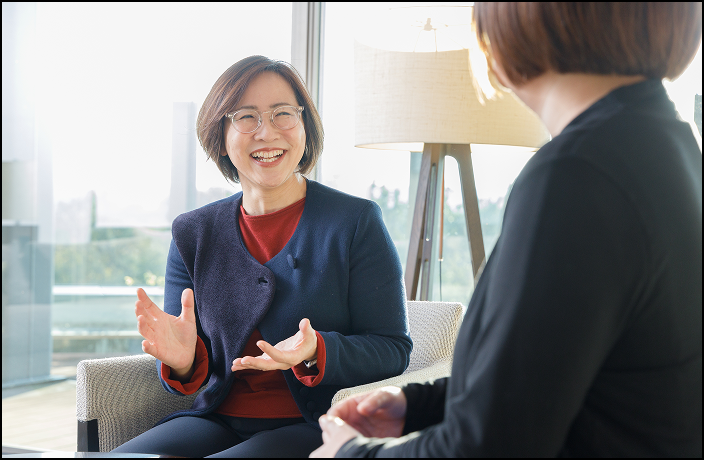
Ikoma: We have all-gender restrooms in the University Hall, a classroom building. This was realized, not following a request from the CGS, but as an active proposal from the clerical organization of the University in charge of facilities. I was delighted to see that an understanding and awareness of gender issues had become widespread across the campus. Common misconceptions that hinder the installation of all-gender toilets include concerns that they could foster criminal activity or exclude women from safespaces. At ICU, we eliminated dead ends and ensured privacy by removing open spaces at the bottom and top of the doors. This design allows users to feel more secure and comfortable. Many may not even notice that they are all-gender restrooms unless specifically informed, as they appear to be perfectly normal restrooms.
Yamaguchi: All-gender toilets are an important factor on campus, as their existence brings peace of mind to students. If they regard themselves as safe, they can concentrate on their studies and enjoy life on campus. In the U.S., it is not rare for both women and men to live on the same floor in the student dormitories. The restrooms are now a political issue as is the case in Japan, but all-gender toilets are scarce, mostly due to budgetary concerns. Most locker rooms in the gym continue to adhere to a binary gender classification system, and progress for new facilities and renovation has been slow. Universities without a generous budget do not have the leeway to prioritize such efforts. This is a serious issue. At Montana State, where I taught, we did have a few all-gender bathrooms, but due to the limited budget, the number was far from sufficient.
Paragraph 04
Expectations for ICU in Promoting Gender Equity and Research in Gender Studies
―― Can the government's promotion of a 'gender-equal society' effectively address and resolve gender inequality? Gender disparity may seem to be moving towards eradication, but there are differences in the way local governments are handling the problem.
Ikoma: The problem is that discussions about a gender-equal society focus primarily on how women can enter the labor market. Despite the economic necessity for women to join the workforce, traditional gender norms remain unchanged. In the end, women face immense pressure balancing external work, domestic responsibilities, and childbirth. In this context, more women view gender issues as a personal concern and have begun voicing their dissatisfaction and grievances.
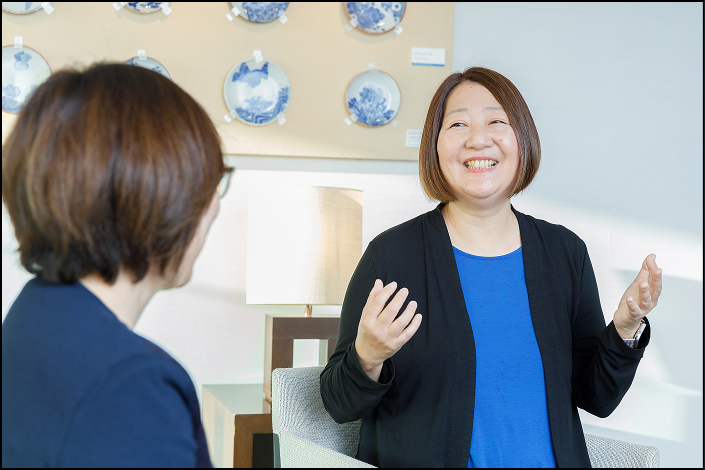
Yamaguchi: I am not very optimistic about future prospects for a gender-equal society. Focusing on human rights and gender-based discrimination would have been more impactful, but the ambiguity of the Japanese term, 'Danjo Kyodo Sankaku' (literally, Male-female Co-participation and Planning) Society, which the government uses for 'gender-equal society,' coupled with the ensuing backlash, undermined the movement. Although the Act on Promotion of Women’s Participation and Advancement in the Workplace was enacted, it has not been working very well. In essence, efforts intended to abolish gender discrimination and promote gender equity have strayed from their original purpose. Although citizens have voiced their concerns through social media and other platforms, systemic changes—such as the adoption of separate surnames for married couples and the legalization of same-sex marriage—have yet to materialize. I am particularly interested in how the second Trump administration will impact Japan’s policies on gender and sexuality.
―― By disseminating academic knowledge to society, the broader community can grow and progress toward a gender-equal future. It is anticipated that a small-scale university in Japan like ICU can play an active role in fostering this transformation through meaningful engagement with society.
Ikoma: We need to not only conduct research at university on gender issues, but we must also reach out to the community, encouraging everyone to view these issues as their own. We will collaborate with local governments to advance this endeavor.
Yamaguchi: ICU’s effort is really important. I hope it showcases its leadership in Japan while actively sharing its initiatives and accomplishments with the global community. I had the chance to read an ICU student request, which was of a quality that could serve as a model for American students. This experience highlighted the potential for meaningful collaboration between American and Japanese students. The significance lies in the fact that progress, such as the installation of non-binary restrooms, emerged from staff proposals rather than a top-down directive. Gender studies face criticism globally. Transgender issues may encounter even more scrutiny, highlighting the need for gender studies to serve as a bastion for progress in the right direction. ICU may be a small university on a small island in the world, but it will be important to share information about its efforts with society steadily and actively.
Paragraph 05
From Gender to DEI: Expanding the Concept of Human Rights
―― The next frontier in addressing human rights issues will be the implementation of DEI (diversity, equity, inclusion) initiatives*5. ICU upholds human rights by embracing and addressing all forms of diversity. Beyond gender, the University is dedicated to organizational DEI efforts, striving to create a society that places stronger emphasis on human rights. Corporations were the first to embrace the concept of DEI, but its practical impact remains uncertain. What strategies can we employ to effectively implement DEI in this situation?
Ikoma: Many companies have adopted the concept of DEI, but its impact may be limited if viewed solely from the lens of economic efficiency or capitalism. If the perspective of human rights is absent, the essential philosophy may be overlooked.
If the University is to engage with this issue, it should address it as a problem of human rights, emphasizing the underlying philosophy. There is a slight difference between equality, which means providing the same treatment to all, and equity in DEI, which incorporates an element of justice. We need to move towards equity by providing fair treatment that takes into account individual differences and circumstances. This is the DEI that ICU aspires to.
Yamaguchi: I totally agree. We should prioritize the philosophy while addressing practical concerns, such as promoting diversity by rectifying imbalances in faculty composition where specific races or genders are overrepresented. We must not only strive to build a diverse workforce but also create an environment where employees feel valued, supported, and motivated to remain. This principle should apply equally to faculty, staff, and students. I would like a diverse community of students, faculty and staff that includes minorities to assemble here and promote DEI.
Ikoma: For a diverse body of students to study comfortably and feel adequately supported, faculty and staff must also come from varied backgrounds and possess a mindset that embraces inclusivity. In addition, they need to be well-informed about minorities: this is the purpose of DEI. By promoting DEI for students, the University must become a role model for society. We must take the lead in advancing fundamental DEI principles in Japan, demonstrating the same commitment as that shown in establishing the CGS and installing all-gender restrooms.
―― Can we realize DEI in an era of uncertainty?
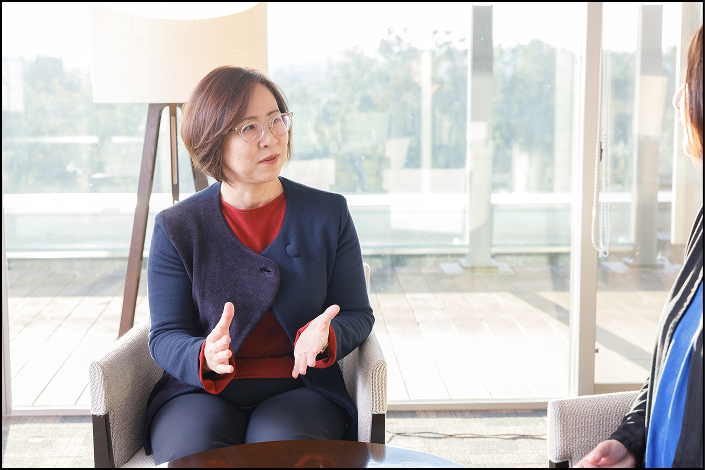
Ikoma: CGS has been the leader on campus in solving gender problems, while also promoting awareness for the need for diversity in race and services for students with issues in accessibility. However, as a research institute rather than a clerical office, its impact on the university organization as a whole has been limited. Moreover, discrimination is not only based on gender, but also other factors such as income, race, religion, and health. Therefore, we are encouraging the University to establish an office dedicated to realizing DEI.
Yamaguchi: Given the current American political climate, DEI initiatives may be gradually diminished. In many red states*6, they have already been banned. DEI departments have been abolished in companies and universities, while more states are prohibiting engagement with DEI. Montana may follow suit any time. I fear how this will affect the situation in Japan*7.
―― To become a role model in society for DEI
Yamaguchi: ICU's efforts have been commendable, but its location in the outskirts of Tokyo leaves it somewhat isolated. Improving this will hinge on fostering interaction with local residents. Without active community engagement, any beneficial initiative risks becoming an internal endeavor. As a state university, Montana State has upheld contribution to the local community as its mission. In this respect, Montana may hold an edge over ICU when it comes to fostering local connections. ICU should make proposals to the vicinity to establish itself as a role model in gender equity and DEI.
Ikoma: I would like ICU to open its doors wider to both local and international communities. Its current cooperation with the local government comes from its intention to establish closer ties with the local community. Covid-19 has hindered progress in this direction, so we are reestablishing our efforts step by step.
*5…DEI: a concept in human rights that recognizes individual diversity, to assure equity to people or groups who have been discriminated against or marginalized, emphasizing inclusion in accepting people from diverse backgrounds.
*6…DEI: a concept in human rights that recognizes individual diversity, to assure equity to people or groups who have been discriminated against or marginalized, emphasizing inclusion in accepting people from diverse backgrounds.
*6) Red state: political lexicon indicating affiliation in the Presidential elections, especially after 2000. Regions where voters vote predominantly Republican are called red states; those leaning towards the Democrats, blue states.
*7…As soon as President Trump assumed office in January this year, he signed an executive order banning DEI in the federal government and the U.S. forces. He also cut federal subsidies for DEI-related efforts. The situation of DEI in the U.S. is steadily deteriorating.
[ Postscript ]
The essence of the liberal arts education at ICU, as seen from this dialogue, is the liberal and active communication that arises naturally from the daily ‘living & learning’ on campus, which is shared and reflected throughout the entire community. Gender problems, DEI and human rights are addressed as distinct issues, not merely theoretical concepts. This approach fosters a liberal arts perspective and a holistic learning experience. This learning process embodies the liberal arts ideal: realizing a society where humans can live better lives.
From a corner of the Japanese archipelago to the world: ICU was established with the mission to nurture individuals who can contribute to global peace. The institution is expected to play a key role in creating a world where everyone can equally thrive, by addressing human rights issues through education and research.
対談の余談
Memories of ICU
―― Awareness for human rights inspired at the matriculation ceremony
- Yamaguchi:
- I still remember making a pledge to abide by the Universal Declaration of Human Rights at the matriculation ceremony. That day is etched in my memory: a university that insists students follow the UDHR from day one demonstrates a profound commitment to human rights.
- Ikoma:
- ICU was founded on remorse for the tragedies of World War II. It continues to ask students to make a pledge to abide by the Declaration so we can overcome differences through dialogue and never suffer the calamity of war.
―― Studying liberal arts opened the door to my research in anthropology
- Yamaguchi:
- I remember visiting the U.S. Army Yokota Base for a peace studies course at ICU. Meeting an anti-base activist there left an indelible impression. It was a very meaningful opportunity to hear directly from a person whose life was impacted by the base.
- Ikoma:
- ICU was unusual in offering a peace studies course in Japan at the time, which must have a deep connection with your work now.
- Yamaguchi:
- Oh, yes. I'm involved in research on social movements, and listening to someone actively participating in the movement was likely a factor that inspired me to work in this field. Although the curriculum did not include a system for studying gender at the time, I wrote my thesis on the subject. I really admire the current teaching and research in gender at ICU.
PROFILE
Professor Natsumi Ikoma, ICU CLA Dean
Professor Ikoma acquired her Ph.D. from Durham University in 2002. Prior to her appointment as CLA Dean in April 2022, she served as Director of the Center for Gender Studies and Head of the Literature Department at ICU. Her research interests include gender, European literature, Japanese literature, literature in general and history of thought. Currently she also serves as a member of the Tokyo Metropolitan Musashino City Promotion of Gender Equality Council.
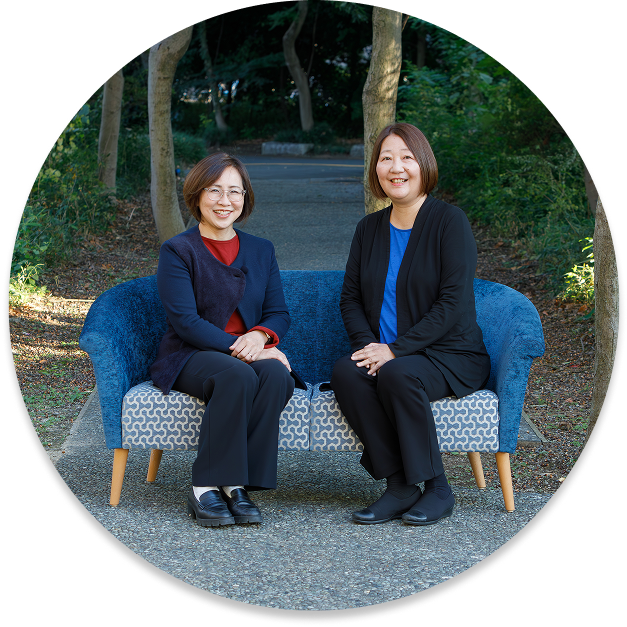
Professor Tomomi Yamaguchi
Professor Yamaguchi was appointed to the Ritsumeikan University College of International Relations in September 2024. She is an associate professor emerita of Montana State University (anthropology). She acquired her Ph.D. in 2004 from the Department of Anthropology at the University of Michigan. After serving as a post-doctoral researcher at the Center for East Asian Studies at the University of Chicago, she taught at Montana State for 17 years, during which time she served for six years as Director of the Women’s, Gender and Sexuality Studies Program. An ICU alumna, her specialty includes cultural anthropology, feminism, and Japan studies.


